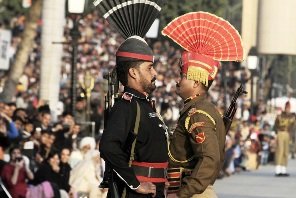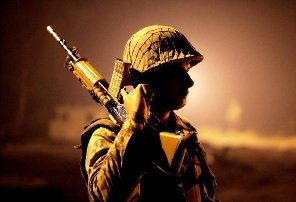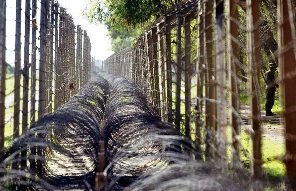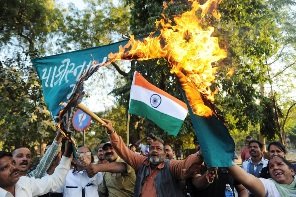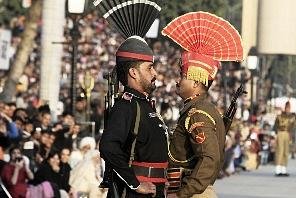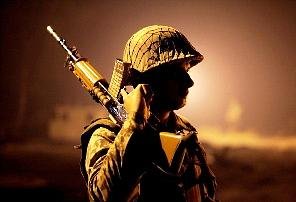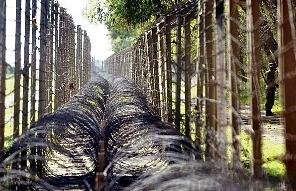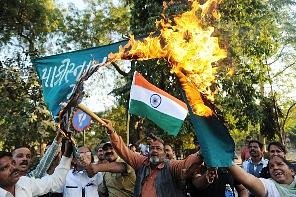India-Pakistan peace initiative in doldrums
A sudden resurgence of military confrontation on ceasefire-line in Kashmir rang alarm bells around the world. The hostile nuclear powers equipped with an arsenal of missiles and sophisticated military hardware with a threatening narrative puts the world peace at risk eventually leading to catastrophic consequences.
The Pakistani military, in a statement, alleged that Indian troops physically raided check-post name "Sawan Patra" killing a soldier and wounding another in Haji Pir Pass in Kashmir area held by Pakistan. (Reports BBC January 6, 2013). In retaliation, as stated by Indian army, Pakistan intrusion in the area held by India resulted in two Indian soldiers killed. (Reports: Sky news January 08, 2013).
The hyped up planned tension, many believe, is helping the ´democratic´ forces of Pakistan to keep the army at bay. It is also believed that a willing political compromise between Manmohan Singh and Asif Ali Zardari has led to the situation at Cease-Fire-Line; an attempt to bailout crumbling governments of Asif Ali Zardari and his friendly opposition government of Sharief Brothers. A swift emergence of Tahirul Qadri (a Canadian Muslim cleric of Pakistani origin) on the political scene has unnerved the political spectrum right across Pakistan. The ruling alliance of Asif Ali Zardari and Nawaz Sharief firmly believes the army attaining political maturity, is set to stage a discreet come back using democracy route to grab the power. The fact remains that Tahirul Qadri played his cards right and the ruling alliance, it looks like, has gone down on the knees.
The behaviour of Pakistan's political mafia for the last 65 years has been appalling and shameful and it is because of the greed and lust of the family rule backed by feudal lords and biradari (close-knit) system that forced and made it convenient for Pakistan army to take over power at different times. If the selfish civilian system had allowed grooming of some Pakistani selfless patriots, the likes of Nehru, Patel or Shastri to take charge, Pakistan would be somewhat different. With a small literacy rate it managed to become a nuclear power, a small but lucrative industrial base, substantial agricultural development and surprising ability to absorb mega corruption shocks.
Times of India – Jang Group effort "Aman ki Asha" (hope for peace) put in cold storage, perhaps temporarily, gave rise to escalation of tensions across cease-fire line. To fulfil the agenda of ‘national importance’ precious lives are wasted as if the people and their families were easy expendables. Any sane person would welcome the move,´ hope for peace´ but the peace comes through following the principle of reciprocity. The advocacy of hope for peace was put to test in Haji Pir on January 06, 2013.
The latent mindset full of hatred and animosity is on the increase and will ever hardly change or diminish, a fact displayed over recently held cricket confrontation. The progeny of late Supremo of Mumbai getting a green signal to push back Pakistani hockey team helped to send the required message across to intended quarters in Pakistan. It is apprehended that such experiments can sometime back-fire with dangerous consequences. So Delhi must consider carefully all pros and cons of these adventurisms before these are launched.
Though India is portrayed as a viable democracy but army does play a role and areas like Assam, Christian belt of North-East, Naxalite and Maoist areas of central India, are a few glaring examples. Kashmir having a ´special status´ has the largest concentration of army on the face of earth. India has its share of Bofors, oil & food scandals as well and Anna Hazare campaign against rampant corruption, spiralling prices of everything needed on daily basis is not presenting a rosy picture of the country. Under the circumstances, the sheer size and resources, as perceived, allows India to sustain the pulls and pressures of such economic cataclysm.
Peace-loving people should have no difficulty to understand that enemies do turn into friends but the Shatrus (enemies) in an Indian dialect will remain Shatrus as long as a political status quo is maintained in Kashmir. The discussion on other bi-lateral issue will anytime take the countries back to square one unless the core issue of Kashmir is addressed with seriousness and sincerity. It will also be a futile exercise if the genuine representative leadership of Kashmir is not allowed to participate in such a dialogue process. The present state of affairs cannot go on unabated and the people at the political helm have to have change of heart to earn peace for the whole region. Sheikhs, Bakshis, Sadiqs, Qasims or Muftis have not been any good to convert "jashni Kashmir" into something concrete and, on the contrary, brought death, misery and agony adding to the problem manifold. The politically enlightened people of Kashmir learned a few lessons to their own cost and changed political environment and thinking on international level helped filter out any unpopular political moves to take the struggle to a logical conclusion. The non-violent approach with patience, commitment and perseverance, is believed to deliver to attain the cherished goal of political independence.
The victims of nostalgia in the sub-continent must realise that people have given lots of sacrifices to achieve certain goals and the resultant achievements through hard work must not be allowed to go waste. India and Pakistan have a great future and the way to go forward is following a policy of allowing peace to prevail, respect for human rights and guaranteed political rights of the people.
Comments
There are 0 comments on this post


